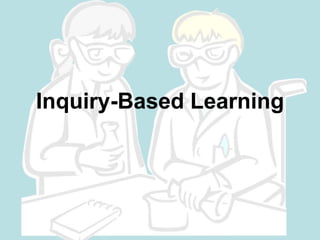
1. inquiry-based-learning
- 2. What is Inquiry? "Inquiry is the active pursuit of meaning involving thought processes that change experience to bits of knowledge. When we see a strange object, for example, we may be puzzled about what it is, what it is made of, what it is used for, how it came into being, and so forth. To find answers to questions such as these we might examine the object closely, subject it to certain tests, compare it with other, more familiar objects, or ask people about it, and for a time our searching would be aimed at finding out whether any of these theories made sense. Or we might simply cast about for information that would suggest new theories for us to test. All these activities--- observing, theorizing, experimenting, theory testing---are part of inquiry. The purpose of the activity is to gather enough information to put together theories that will make new experiences less strange and more meaningful." (Suchman, 1968, p.1)
- 3. INQUIRY •Is a learning process that motivates you to obtain knowledge or information about people, things, places, or events.
- 4. Inquiry elevates your thinking power. It makes you think in different ways, enabling you to arrive at a particular idea or understanding that will motivate you to create something unique, new, or innovative for your personal growth as well as for the world.
- 5. Governing Principles or Foundation of Inquiry
- 7. •Lead students through a series of questions •Promoted critical thinking
- 9. •Children should learn what they want to learn •Promoted the idea of learning through nature
- 11. •Believed that knowledge comes from experiences and reflecting on/questioning those experiences •Utilized the scientific method for students to learn through predictions, experiments, and conclusions •Focused on the learner and his/her environment •Emphasized the power of students' natural curiosity •Promoted the importance of a "community of learners" •Encouraged the use of manipulative materials for involvement and understanding
- 13. •Believed that children construct their own knowledge •Focused on discovery and active involvement of the student •Stressed the importance of teaching children at a developmentally appropriate level •Emphasized the role of prior knowledge •Strong belief in knowledge construction: introduced the concept that as people learn, they either assimilate knowledge into their existing mental schemas, or they adjust their mental schemas to accept the new knowledge.
- 15. •Believed that children create their own concepts •Developed the concept of assisted learning, or Social Constructivism •Strong emphasis on the use of prior knowledge and scaffolding •Proposed that the role of the teacher is to support and guide learning by helping them develop higher level thinking skills, which they could then use independently.
- 17. •Defined the theory of Discovery Learning, where students discover knowledge for themselves through experimentation and exploration •Emphasized that teachers role is to guide student learning •Believed in the importance of students using their prior knowledge and experiences in learning •Looked upon learning as an active and social process
- 18. Spiral Path of Inquiry
- 19. Strengths of Inquiry • Emphasis is put on understanding and learning, not on memorization. • Students have understanding of the larger concepts related to specific concepts. • Inquiry develops the mind for a lifetime quest of knowledge and understanding • Inquiry activities can be more engaging and interesting to students than “chalk and talk”. • Works with any age group so it can be applied in many different educational settings. • Builds off all experiences and knowledge that students bring to the classroom, no matter how diverse these may be.
- 20. Weaknesses of Inquiry • Enough specific topics may not be covered in a school year when only Inquiry is used. • Many students do not know how to ask questions so teachers first attempts at Inquiry may seem difficult or discouraging • Inquiry focuses on helping children ask questions. Therefore, instructors must learn the art of asking good questions.
- 23. 1. Elevates interpretative thinking through graphic skills. 2. Improves students learning abilities 3. Widens learners’ vocabulary 4. Facilitates problem-solving acts 5. Increase social awareness and cultural knowledge
- 24. 6. Encourages cooperative learning 7. Provides mastery of procedural knowledge 8. Encourages higher-order thinking skills strategies 9. Hastens conceptual understanding
- 25. Educators, businessmen, and other professionals consider all these benefits of Inquiry-based learning in various fields of knowledge to crucial to the success of anyone in the 21st Century
- 26. QUIZ N0.1
- 27. DIRECTION: CHOOSE THE LETTER OF THE CORRECT ANSWER. WRITE YOUR ANSWER ON THE ANSWER SHEET
- 28. 1. It is the active pursuit of meaning involving thought processes that change experience to bits of knowledge. a. Research b. Inquiry c. Nature d. Study 2. He believed in the importance of students using their prior knowledge and experiences in learning a. John Dewey b. Jerome Bruner c. Jean Jacques Rousseau d. Jean Piaget 3. The witness’ statement is crucial to the solution of the case. What is the meaning of the italicized word in the sentence? a. Vital b. Deal c. Search D. Deep
- 29. 4. He believed that knowledge comes from experiences and reflecting on/questioning those experiences. a. John Dewey b. Jerome Bruner c. Jean Jacques Rousseau d. Jean Piaget 5. He emphasized that teachers role is to guide the students learning. a. John Dewey b. Jerome Bruner c. Jean Jacques Rousseau d. Jean Piaget
- 30. II. Give at least 5 benefits of inquiry based learning